The 19th Party Congress saw a reshuffling of China’s leadership. The Fairbank Center presents an updated visual guide to what we know about China’s new leaders of party and state. By Yuanzhuo Wang, Research Associate at Harvard Business School, and James Gethyn Evans, Communications Officer at the Fairbank Center for Chinese Studies.
China’s Leadership after the 19th Party Congress:
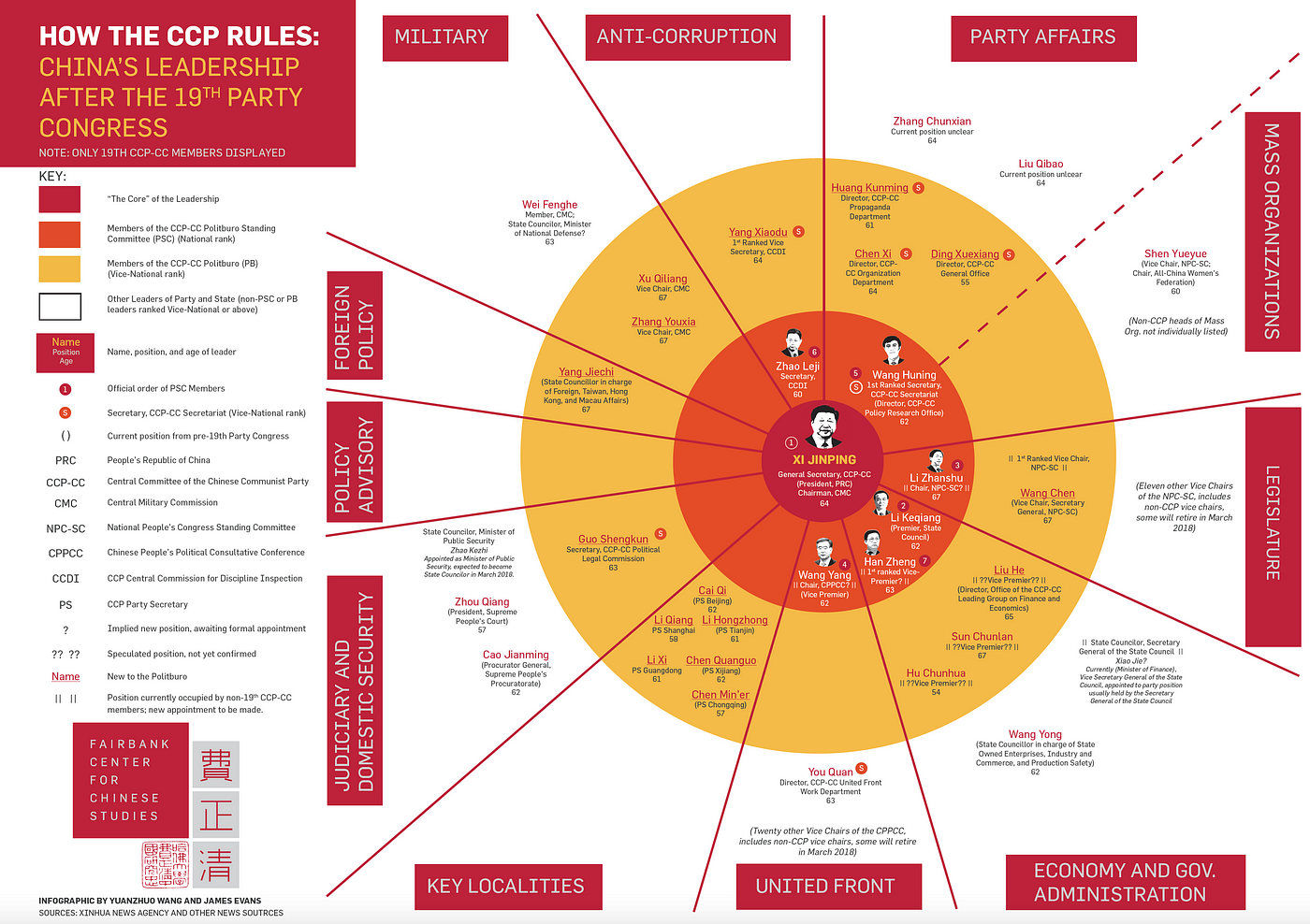
On October 25, 2017, after the conclusion of its 19th Congress, the Communist Party of China (CCP) unveiled its leadership for the next five years. The new leadership was elected by the CCP’s 19th Central Committee (CCP-CC), which was elected by the Party Congress on October 24.
As expected, Xi Jinping 习近平 was elected to a second term as the CCP-CC’s General Secretary, the party’s top position (denoted by the red circle in the graphic). Aside from the affirmation of his status as Core of the CCP’s Fifth Generation Leadership, Xi also had his eponymous ideology enshrined in the Party Constitution, thereby gaining an even more elevated status in the CCP.
The Politburo Standing Committee (PSC), the highest decision making body in China (denoted by the orange circle), chaired by the General Secretary, remained at seven members with five new appointments. All 19th PSC members were members of the 18th Politburo.The retirement age of 68 for Politburo members was respected. Breaking with recent conventions, however, no “heir-apparent” to either the General Secretary or the Premier was named, judged by the fact that no 19th PSC members are younger than 58 and thus cannot serve two additional five year terms after 2022 under current age restrictions.
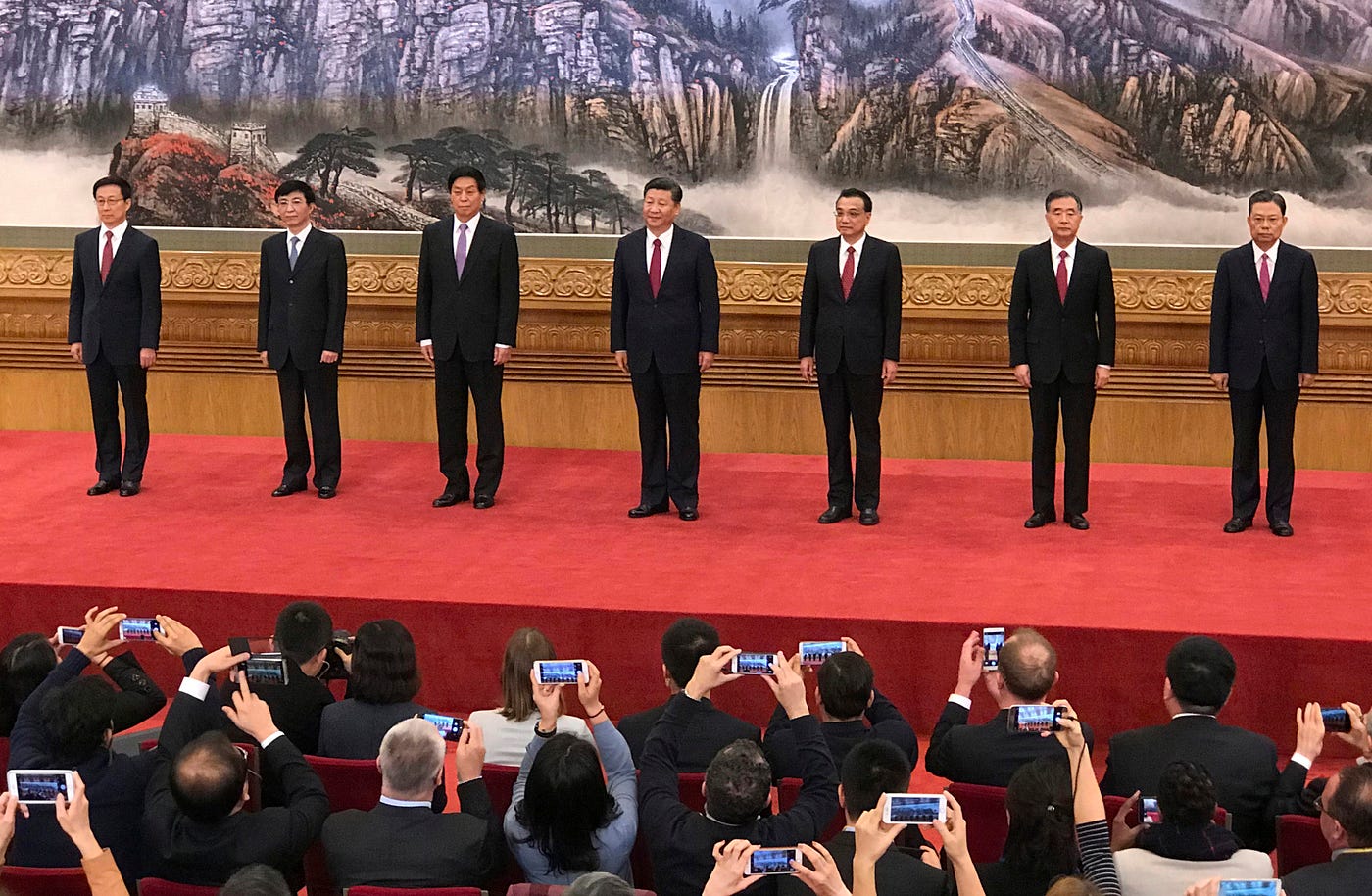
Fifteen of the twenty five 19th Politburo members were new to the Politburo. Three 18th Politburo members either retired in full (like Li Yuanchao 李源潮) or lost their Politburo seats while retaining membership on the 19th CCP-CC (such as Liu Qibao 刘奇葆 and Zhang Chunxian 张春贤) despite being under the retirement age of 68.
While many of the key party posts have been formally filled by 19th Politburo members since the Congress, other state positions at the vice national rank and above remain occupied by retiring leaders (i.e. those who did not become 19th CCP-CC members; these leaders are not displayed in the graphic and the position they occupy are marked with || ___ || where relevant). Some of the replacements of these retiring leaders can be inferred with a relatively high degree of certainty (those titles marked with “?” in the graphic) based on past precedence and other positions they have been assigned to since the Party Congress.
Replacements for others may remain speculative (marked with ?? __ ?? in the graphic) until as late as March 2018, when the new National People’s Congress (NPC) and Chinese People’s Political Consultative Conference (CPPCC) are expected to meet to formally elect new national leaders from candidates nominated by the CCP. Leaders who had their current positions assigned before the Party Congress are denoted with parentheses in the graphic.
Below is a brief overview of the roles of the members of the 19th CCP-CC Politburo, the 19th CCP-CC Secretariat, and other leaders with vice-national rank and above who are members of the 19th CCP-CC:
Party Affairs
PSC Member in Charge: (Xi Jinping 习近平), Wang Huning 王沪宁
Lead Organ: CCP Central Committee Secretariat (中共中央书记处)
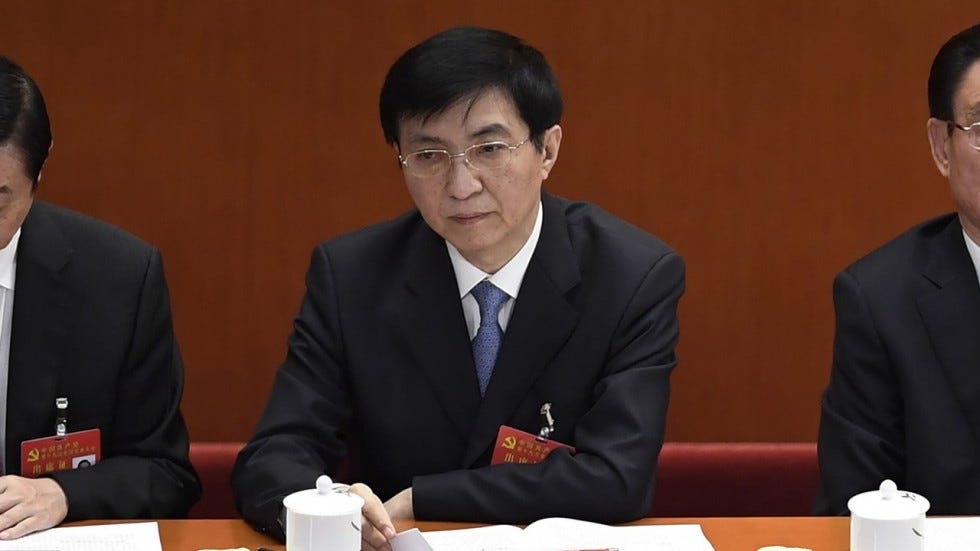
The management of party affairs is coordinated through the CCP-CC Secretariat, headed by the first ranked Secretary Wang Huning 王沪宁 who reports to the General Secretary, Xi Jinping. Wang, originally an academic at Fudan University in Shanghai specializing in international relations, has been the Director of the CCP-CC Policy Research Office since 2002, a position he may relinquish given his promotion into the PSC.
Key components of party affairs include:
Organization: controls party and government personnel appointments above vice-minister/vice-governor rank; now headed by Secretary of the CCP-CC Secretariat Chen Xi 陈希.
Propaganda: controls the media and party ideology; now headed by Secretary of the CCP-CC Secretariat Huang Kunming 黄坤明.
CCP-CC General Office: administrative and internal communications center of the CCP; now headed by Secretary of the CCP-CC Secretariat and Xi’s office director (chief of staff) Ding Xuexiang 丁薛祥.
Central Party School: trains party officials, and had previously been headed by the first-ranked Secretary of the CCP-CC Secretariat until the appointment of Chen Xi 陈希, Director of the CCP-CC Organization Department, as president of the school.
Other members of the 19th CCP-CC Secretariat included fist ranked Vice Secretary of the CCDI Yang Xiaodu 杨晓渡, Secretary of the CCP-CC Political Legal Commission Guo Shengkun 郭声琨, and former Fujian Party Secretary You Quan 尤权.
Legislature
PSC Member in Charge: (Xi Jinping 习近平), Li Zhanshu 栗战书 (?)
Lead Organ: Standing Committee of the National People’s Congress (NPC-SC) (全国人大常委会)

The NPC-SC amends/interprets the PRC’s constitution and drafts and passes legislation. Through its powers to interpret the Hong Kong and Macau Basic Laws, the NPC-SC also plays a leading role in Hong Kong and Macau Affairs, the specifics of which are handled through the CCP-CC United Front Work Department and the Hong Kong and Macau Office of the State Council.
By his no. 3 ranking on the 19th PSC, Li Zhanshu 栗战书 is expected to chair the new (13th) NPC-SC when it meets in March 2018. Li served as Director of the CCP-CC General Office under Xi for the past five years.
The numerous vice chairs of the NPC-SC head some of the eight CCP approved “democratic parties” or important “mass organizations”, represent key ethnic minority groups, or are senior officials in semi-retirement helping to draft national legislations. Some of these vice chairs are non-CCP members but all follow CCP leadership. Some of these vice chairs will be replaced in March 2018.
Current Vice Chair and Secretary General of the NPC-SC Wang Chen has gained a seat on the 19th Politburo. He may become the first ranked Vice Chair of the NPC-SC in 2018 or be moved to another position.
Mass Organizations
PSC Member in Charge: (Xi Jinping 习近平), Wang Huning 王沪宁
Lead Organ: Politburo member (s) overseeing mass organizations
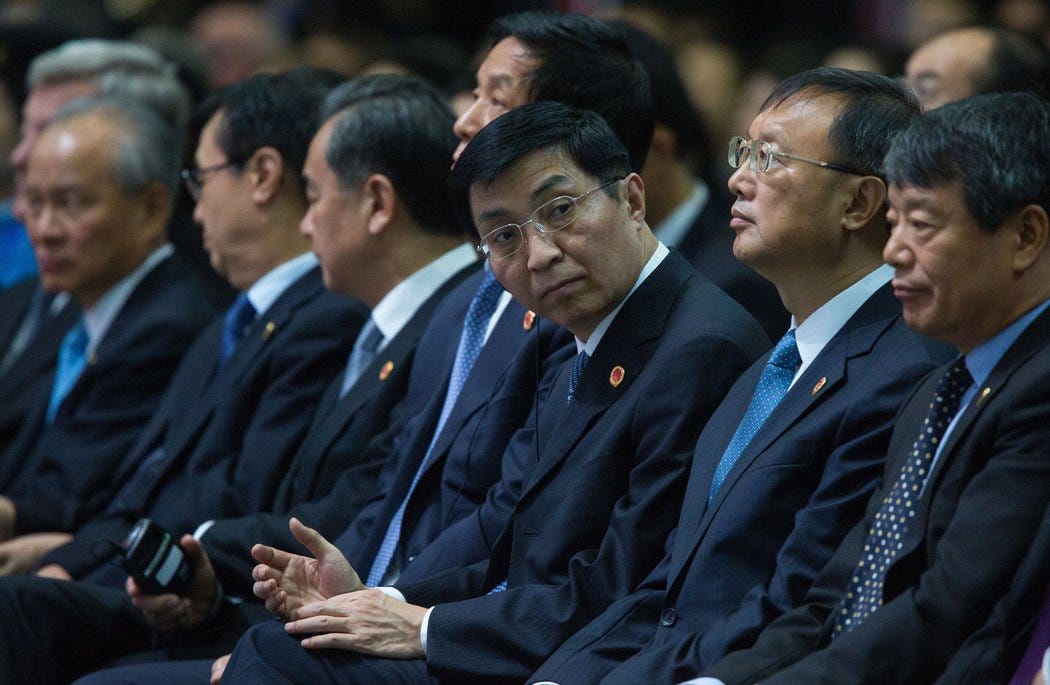
The CCP usually appoints a Politburo member to serve as the first-ranked Vice Chair of the NPC overseeing “mass organizations” that manage relationships with various socio-economic/professional groups. These groups include the All-China Federation of Trade Unions, the All-China Women’s Federation, and the All-China Youth Federation to name a few.
Heads of mass organizations are usually minister-ranked (and therefore not shown on the infographic), unless they concurrently serve as Vice Chair of the NPC-SC, such as Shen Yueyue 沈跃跃, the Chairwoman of the All-China Women’s Federation.
It is unclear so far which 19th Politburo member would be appointed to oversee mass organizations under the supervision of Wang Huning.
Economy and Government Administration
PSC Member in Charge: (Xi Jinping 习近平), Li Keqiang 李克强, Han Zheng 韩正(?)
Lead Organ: State Council (国务院), CCP-CC Leading Group on Finance and Economic Affairs (中共中央财经领导小组办公室)
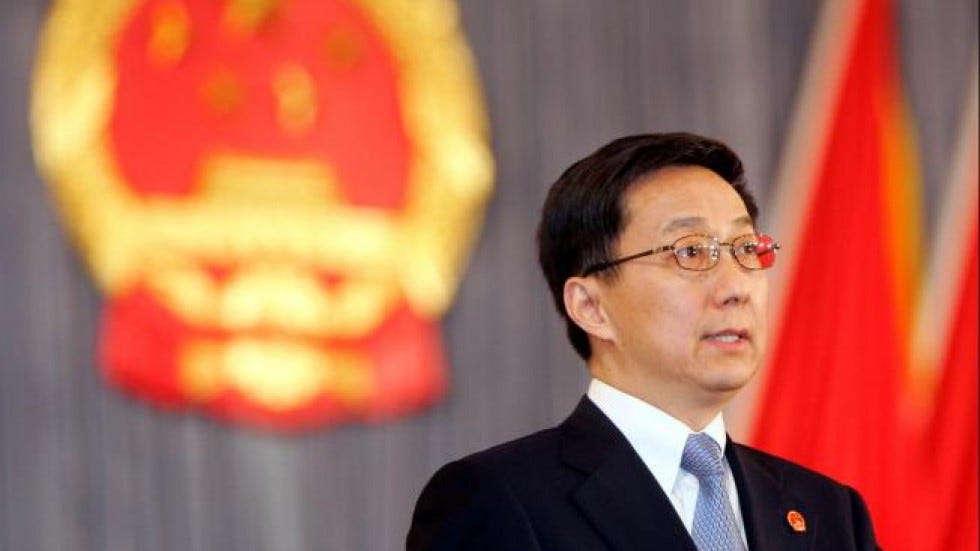
The State Council is the executive arm of the Chinese government, which proposes and implements policy and regulations that impact government, economy, and society. Each State Council Vice Premier or State Councilor oversees several ministries that regulate key sectors of the economy or handle other affairs of the state.
CCP policy coordinating groups, like the Office of the CCP-CC Leading Group on Finance and Economic Affairs, also coordinate economic policy at the highest level. The Leading Group on Finance and Economic Affairs is headed by Xi Jinping with Premier Li Keqiang 李克强 serving as Deputy Head. Li is expected to remain Premier for another term.
By his no. 7 ranking on the 19th PSC, Han Zheng 韩正 is expected to take over as the first ranked Vice Premier of the State Council in March 2018. Han spent most of his career in Shanghai, serving as mayor when Xi served briefly as Shanghai’s party secretary in 2007.
According to precedence, three additional Vice Premierships will be filled by Politburo members in March 2018. Likely candidates include:
- Sun Chunlan 孙春兰: former Director of the CCP-CC United Front Work Department
- Hu Chunhua 胡春华: former Party Secretary of Guangdong
- Liu He 刘鹤: Director of the Office of the CCP-CC Leading Group on Finance and Economics, Minister-ranked Vice Minister of the National Development and Reform Commission
- Yang Jiechi 杨洁篪: State Councilor in charge of foreign affairs
Sun may take over the portfolio of her retiring female colleague on the 18th Politburo, Vice Premier Liu Yandong 刘延东, to oversee education, science, culture, health, and sports on the State Council.
Hu may take over any number of portfolios on the State Council. Two previous party secretaries of Guangdong before Hu became Vice Premiers after leaving the post: Wang Yang took over trade, agriculture, tourism, poverty reduction, and disaster relief; Zhang Dejiang took over infrastructure, industry, and production safety.
Believed to be one of Xi Jinping’s most trusted economic advisors and one of the chief architects of “supply-side structural reforms,” Liu He may take over finance and other key portfolios on the State Council, including chairing a newly created Financial Stability and Development Commission. Liu may also replace Wang Huning as the Director of the CCP-CC Policy Research Office, but that appointment, which may yet come, has not been made during the post-congress turnover of major CCP-CC offices.
United Front
PSC Member in Charge: (Xi Jinping 习近平), Wang Yang 汪洋(?)
Lead Organ: National Committee of the Chinese People’s Political Consultative Conference (CPPCC) (全国政协)

The CPPCC is used to manage the CCP’s relationship with non-CCP organizations and individuals, including important ethnic/religious figures from China’s autonomous regions, CCP-friendly political and business leaders of Taiwan, Hong Kong/Macau, and overseas, and other social influencers in China, such as actors, singers, and athletes.
The CCP-CC Central United Front Work Department is the party organ managing united front work while the CPPCC hosts the “targets” of united front work.
By his no. 4 ranking on the 19th PSC, Wang Yang 汪洋 is expected to chair the new (13th) CPPCC when it meets in March 2018. Wang is currently the Vice Premier in charge of trade, agriculture, tourism, poverty reduction, and disaster relief, a post he will resign in March 2018.
Sun Chunlan 孙春兰, the only woman on the 19th Politburo, was replaced by new Secretary of the CCP-CC Secretariat You Quan 尤权 as the Director of the CCP-CC United Front Work Department after the party congress.
The numerous vice chairs of the CPPCC head some of the eight CCP approved “democratic parties” or important “mass organizations”, represent key ethnic minority groups, or are senior officials in semi-retirement advising policy. Some of these vice chairmen/chairwomen are non-CCP members but all follow CCP leadership. Some of these vice chairs will retire in March 2018.
Anti-Corruption
PSC Member in Charge: (Xi Jinping 习近平), Zhao Leji 赵乐际
Lead Organ: CCP Central Commission for Discipline Inspection (CCDI) (中共中央纪律检查委员会)
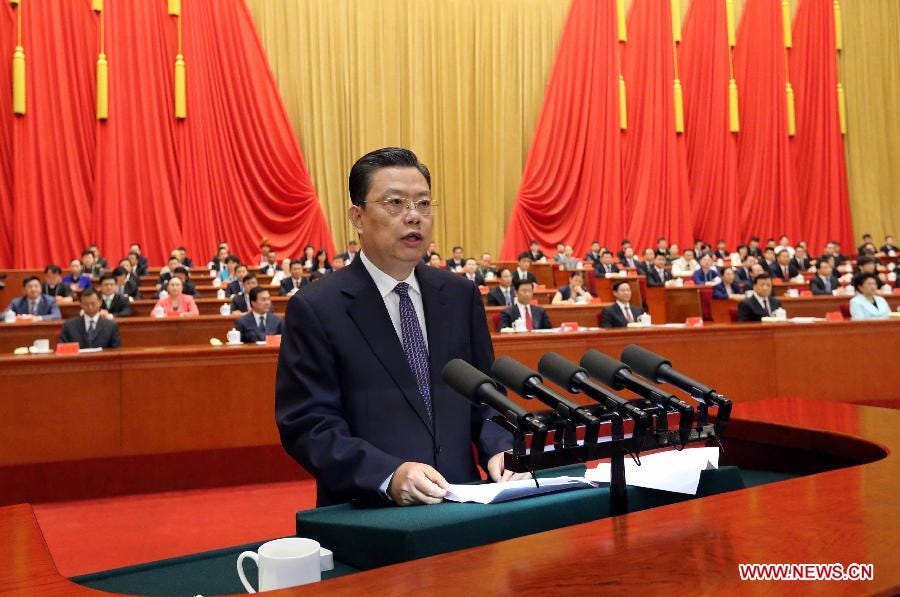
The CCDI enforces “party discipline” with extra-judicial powers to detain and investigate party members for any number of suspected “disciplinary violations”, including corruption. Under former Secretary Wang Qishan 王岐山, the CCDI sent “inspection teams” into other government agencies and localities to conduct investigations as part of Xi Jinping’s anti-corruption campaign.
Zhao Leji 赵乐际 was elected to replace Wang Qishan as Secretary of the CCDI during the 19th Party Congress.
Yang Xiaodu 杨晓渡, new first ranked Vice Secretary of the CCDI gained a Politburo seat in addition to a seat on the CCP-CC Secretariat, indicating the enhanced status of the anti-corruption organ. Yang could potentially head a new National Supervision Commission if it is created in March 2018 by the NPC.
Judiciary and Domestic Security
PSC Member in Charge: Xi Jinping 习近平
Lead Organ: CCP-CC Political and Legal Affairs Committee (PLAC) (中共中央政法委员会)

“Political legal work” covers:
Law enforcement: through the Ministry of Public Security under the State Council, which controls the police.
Court system: through the Supreme People’s Court (SPC).
State prosecutors: through the Supreme People’s Procuratorate (SPP).
State security: through the Ministry of State Security under the State Council.
The presidents of the SPC and SPP are “elected” by the NPC and legally report to the NPC or the NPC-SC. In practice, they are members of the CCP-CC PLAC and are supervised by the CCP. From 2002–2012, the secretary (head) of the committee served as a member of the PSC, but the position was demoted to Politburo status to give more authority to the General Secretary/President.
Guo Shengkun 郭声琨, new Secretary of the CCP-CC Political Legal Commission (PLC) also gained a seat on the 19th CCP-CC Secretariat, highlighting the importance of the domestic security portfolio. Either the Secretary of the CCP-CC PLC or the Minister of Public Security have served on the CCP-CC Secretariat between 1987 and 2007
Other CCP policy-coordinating organs, such as the newly created CCP Central National Security Commission (headed by Xi Jinping), also influence national security policy.
Policy Advisory
PSC Member in Charge: Xi Jinping 习近平, Wang Huning 王沪宁
Lead Organ: CCP-CC Central Policy Research Office (中共中央政策研究室)
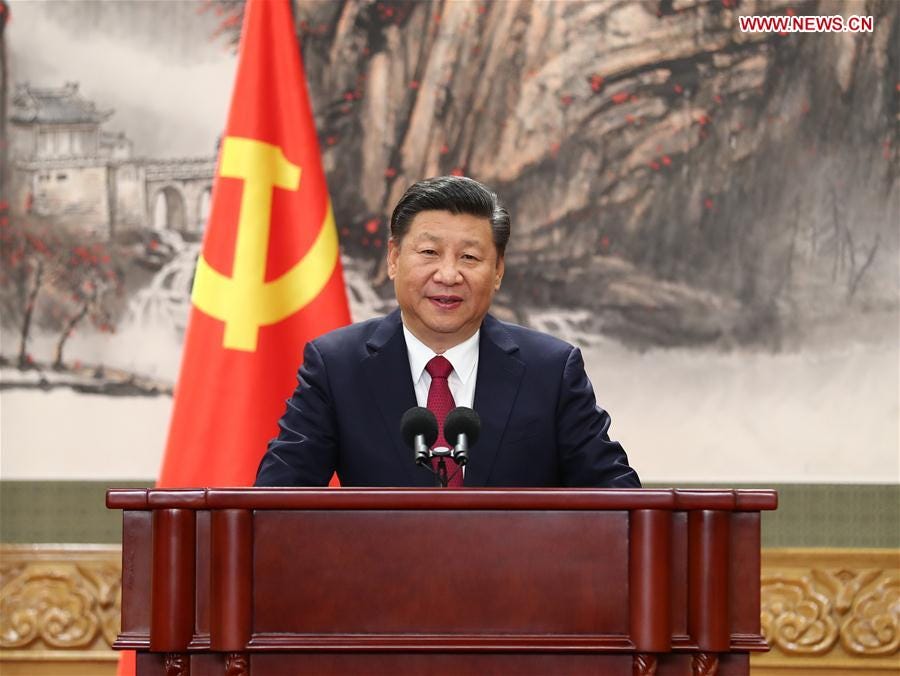
The CCP-CC Central Policy Research Office drafts key party and national policy documents, including important speeches for China’s leaders. The office’s director since 2002, Wang Huning 王沪宁, was elected to the 19th PSC. His replacement is unclear.
Liu He 刘鹤, Director of the Office of the CCP-CC Leading Group on Finance and Economic Affairs, minister-ranked Vice Minister of the National Development and Reform Commission, and Xi Jinping’s chief economic advisor is a potential candidate to replace Wang Huning. He is also a potential candidate for Vice Premier.
Wang Huning also served as the Office Director of the CCP-CC Leading Group on Deepening Reform when he was Director of the Policy Research Office, a role his successor may also take over. This position has influence over the drafting and coordination of reform policies.
Foreign Policy
PSC Member in Charge: Xi Jinping 习近平
Lead Organ: Office of the CCP-CC Leading Group on Foreign Affairs (headed by the State Councilor in charge of foreign affairs) (中共中央外事领导小组办公室)
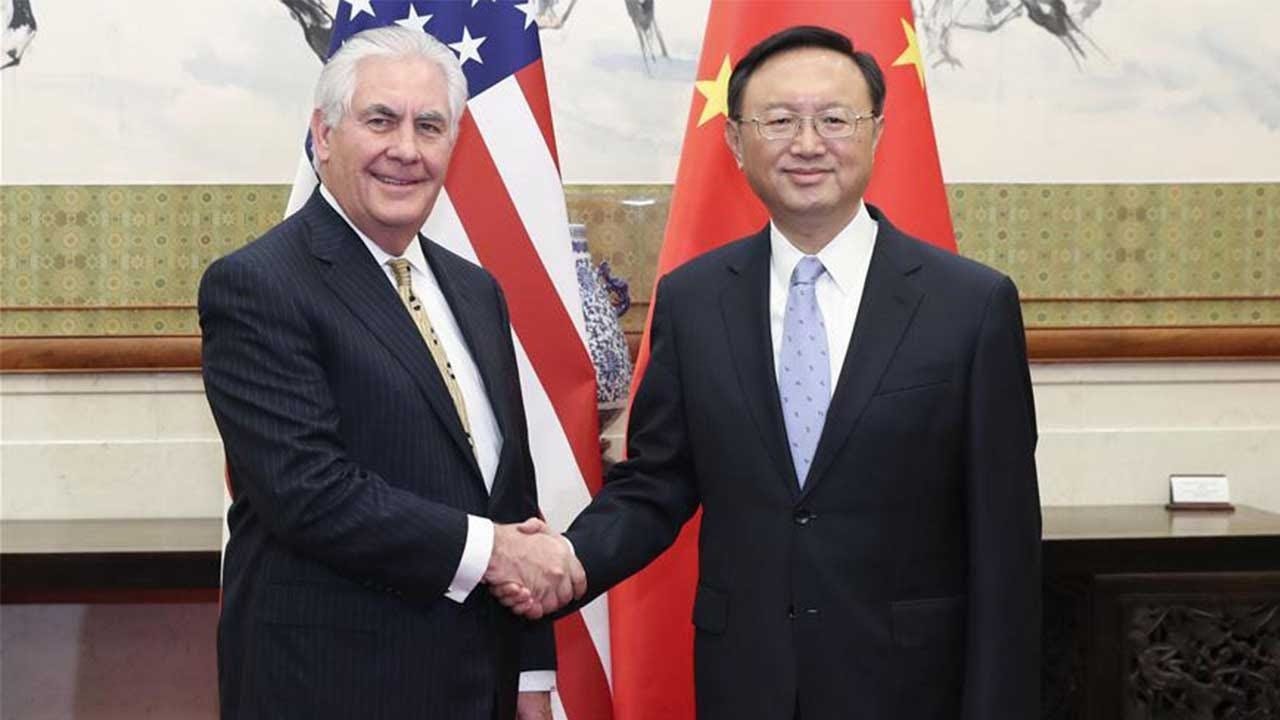
As head of the CCP-CC Leading Group on Foreign Affairs, Xi Jinping has direct oversight over foreign policy. China’s highest ranking professional diplomat State Councilor Yang Jiechi 杨洁篪 was elected to the 19th Politburo, the first time a professional diplomat had gained a Politburo seat since 2002 when Vice Premier Qian Qichen 钱其琛 retired from the body. Yang may be promoted to Vice Premier in 2018, remain a state councilor with continuing oversight over foreign affairs, or be moved to another position.
Other CCP policy coordinating organs, such as the newly created CCP Central National Security Commission, may also influence foreign policy.
Military
PSC Member in Charge: Xi Jinping 习近平
Lead Organ: Central Military Commission of the CCP-CC and of the PRC (CMC) (中共中央军事委员会/中华人民共和国军事委员会)
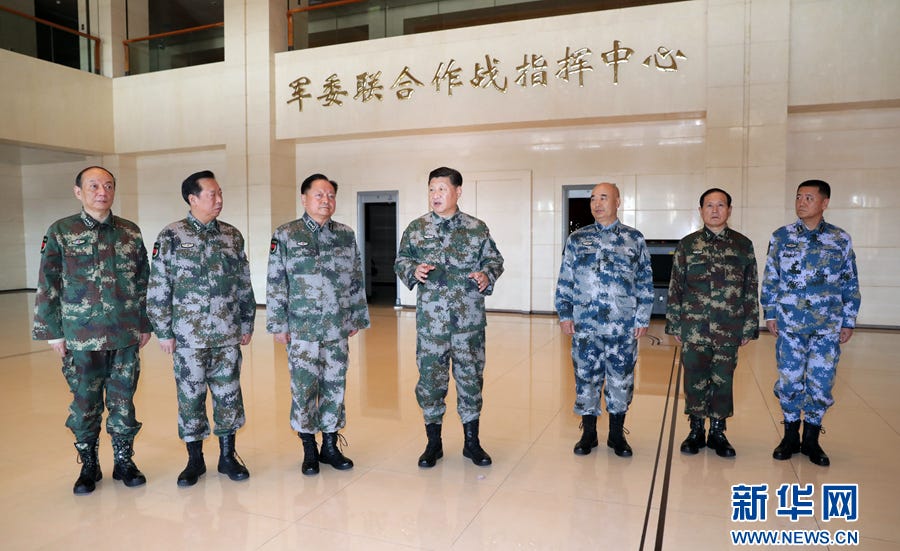
As the Chairman of both the Central Military Commission of the CCP and the PRC, Xi Jinping has direct oversight over military affairs. Under Xi, the military’s organization and command structure was streamlined to give the CMC more direct control over the military, and to improve joint-operation capabilities of the People’s Liberation Army (PLA).
Since 1997, the two highest ranking officers of the PLA have been Politburo members. Generals Xu Qiliang 许其亮 and Zhang Youxia 张又侠 now fill these roles on the 19th Politburo as Vice Chairmen of the CMC. The need for the CCP to retain “absolute control” over the PLA was re-emphasized during the 19th Party Congress.
Key Localities
Provincial-level Party Secretaries represented on the 19th Politburo include: Beijing (Directly Administered Municipality), Shanghai (Directly Administered Municipality), Tianjin (Directly Administered Municipality), Chongqing (Directly Administered Municipality), Guangdong (Province), and Xinjiang (Autonomous Region)

The Communist Party Secretary (PS) is the highest ranking official of a locality, while the local head of government (the governor or mayor) is the PS’s deputy. The PS of these key localities add local perspectives to central policy-making and help with policy implementation in their geographic areas.
The non-Politburo member PS of Beijing, Tianjin, Chongqing, and Xinjiang all gained membership on the 19th Politburo. Two new Politburo members were appointed as PS of Shanghai and Guangdong respectively, replacing previous Politburo member PS.
Download the full-sized infographic from the Fairbank Center’s website.
China’s Leadership From the 18th Party Congress:
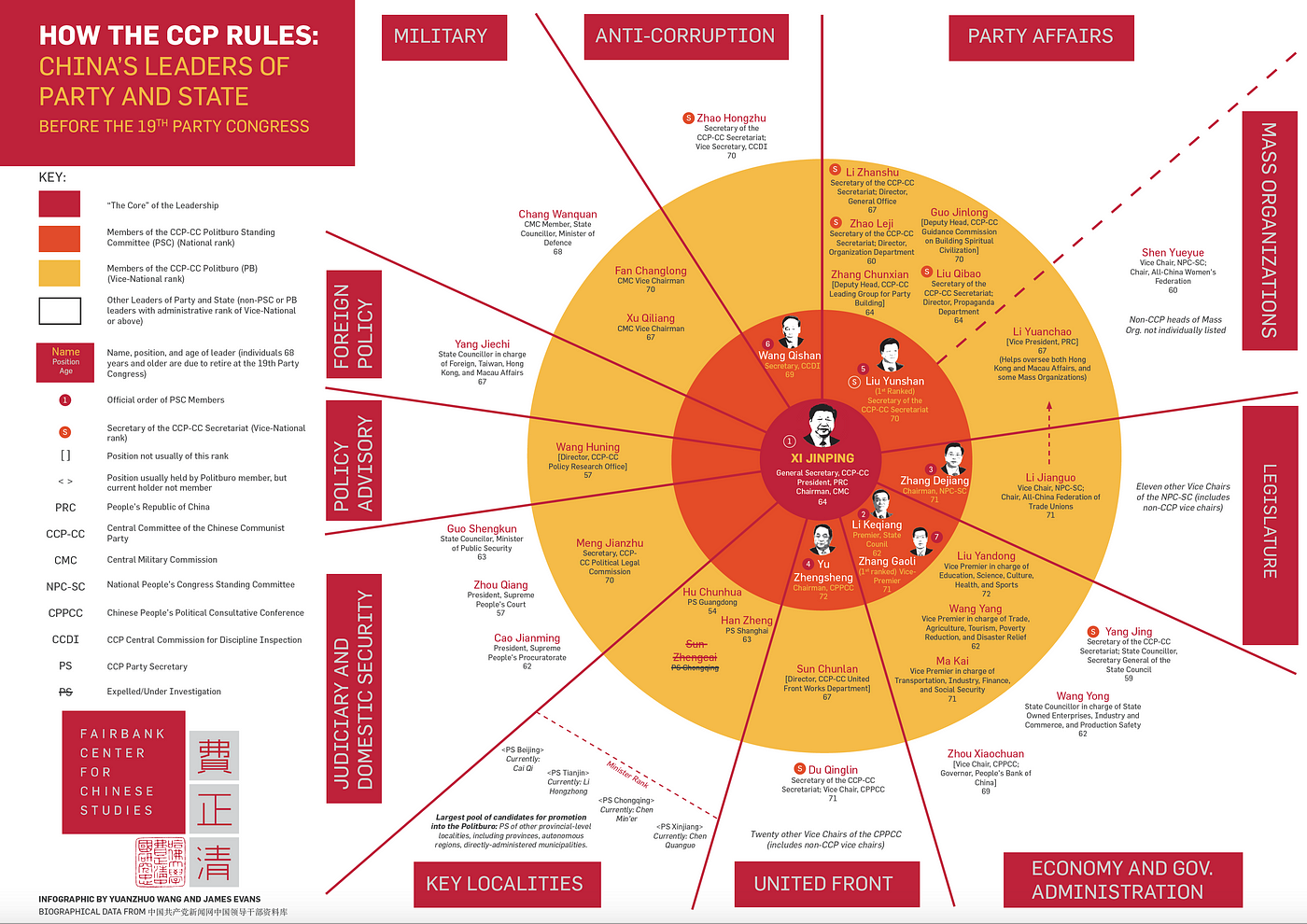
Infographics and analysis by Yuan Wang, Research Associate at Harvard Business School, and James Evans, Publications Coordinator at the Fairbank Center for Chinese Studies.

